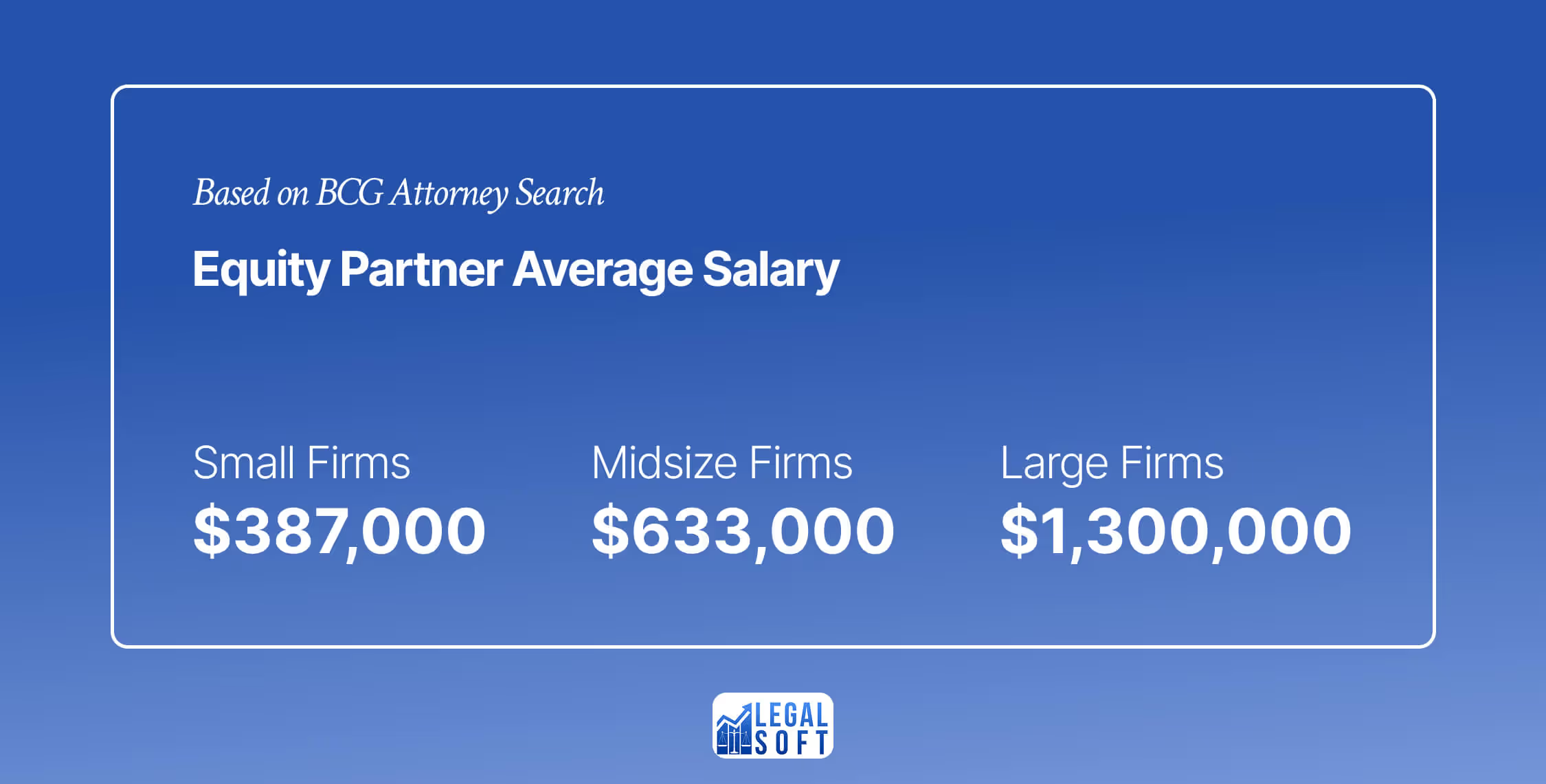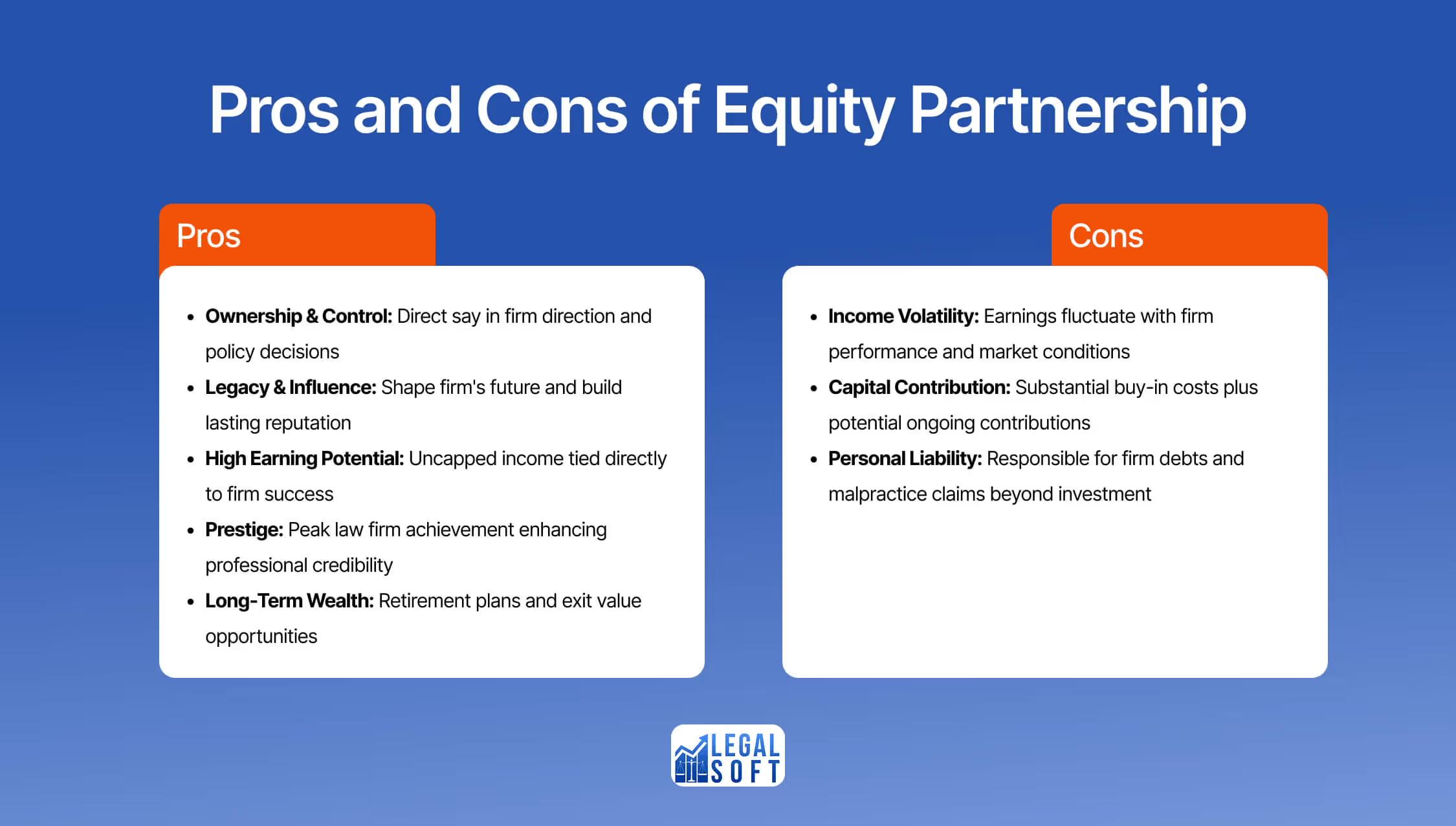Reaching the top of the law firm career ladder as a “partner” is often the primary motivation for many attorneys. The financial rewards and decision-making authority that come with partnership make it a powerful long-term goal. While law firm partnership structures have evolved over the years with new models, the traditional equity partnership remains the highest stake.
However, the path to equity partnership doesn’t always go as planned. It is shaped by many factors and depends on each attorney’s unique circumstances. In this guide, we’ll break down what equity partnership truly means, outline the responsibilities that come with it, and share insights to help you determine whether it’s the right move for your law firm.
Defining an Equity Partner
An equity partner is an individual who holds an ownership stake in a law firm. As part-owners of the business, their financial success is directly tied to the firm’s performance. Equity partners contribute capital in exchange for a share of the firm’s profits and losses, based on their equity percentage.
Equity partners are often involved in firm decision-making and business development, helping shape the overall direction of the firm. They share in the firm’s financial risks and are responsible for its debts and obligations, but they also earn a significant share of the profits when the firm performs well.
What does an Equity Partner do?
As we've established, equity partners are part-owners of the law firm who share in both profits and decision-making responsibilities. But what exactly does an equity partner do?
Typical equity partner responsibilities include:
- Legal work. Equity partners continue to practice law, often handling high-stakes cases and managing complex client relationships. Their expertise is relied upon for the most challenging matters that demand senior-level attention.
- Generate business. As part-owners, they are responsible for generating revenue by attracting new clients, maintaining strong relationships with existing ones, and ensuring profitable outcomes for the firm.
- Manage the firm. Equity partners take part in key business decisions that shape the firm’s performance, including financial planning, policy development, and talent recruitment. They also identify and adopt technologies that improve productivity.
- Leadership and mentorship. They guide junior attorneys, associates, and staff, helping develop the next generation of legal talent within the firm.
- Risk management. Because they share in the firm’s profits and losses, equity partners assess and manage risks that could affect profitability, stability, or reputation.
Equity Partner Salary
Equity partners don’t receive fixed salaries. Instead, they earn distributions from the firm’s profits. According to BCG Attorney Search’s 2024 Partner Compensation Report, the average annual compensation for equity partners in 2025 was $387,000 at small firms, $633,000 at midsize firms, and $1,300,000 at large firms.

There’s no exact figure for an equity partner’s earnings, as compensation is directly tied to the firm’s performance—rising in strong years and shrinking during difficult periods. Other factors also influence income, including firm size, location, and practice area.
Equity vs. Non-Equity Partner Law Firm
Unlike equity partners, who are part-owners of the firm, non-equity partners do not hold any ownership stake and do not share in profit distributions.
Non-equity partners are often referred to as “salaried partners” because they receive a fixed salary, sometimes supplemented by performance-based bonuses. Regardless of how well the firm performs, their salary remains the same. However, unlike equity partners, they do not carry personal liability for the firm’s debts or ownership obligations.
Equity Partnership Capital Contributions
A capital contribution is the financial investment or “buy-in” required from a lawyer to become a partner in a law firm. This contribution is typically paid in cash, sometimes in other assets, in exchange for an ownership stake in the firm.
Depending on the firm, capital contributions often range from 25 to 35 percent of the partner’s anticipated annual compensation. In return, the lawyer gains the right to share in the firm’s profits and losses, as well as a voice in its governance.
What It Covers
Your investment as an equity partner helps fund the firm’s working capital. This includes expenses such as office space, staff salaries, marketing, technology, insurance, and other operational costs. Essentially, your capital serves as an investment that keeps the firm running and enables it to generate revenue for its partners.
Advantages and Disadvantages of Equity Partnership

Pros
- Ownership and Control: As part-owners, equity partners have a direct say in the firm’s direction, business development, and policy decisions.
- Legacy and Influence: Equity partners can shape the firm’s future and build a lasting legacy within the legal community.
- High Earning Potential: Income is not capped by a fixed salary; it is directly tied to the firm’s success, offering the potential for significant compensation in profitable years.
- Prestige: Equity partnership represents the peak of law firm achievement, enhancing professional reputation and credibility.
- Long-Term Wealth Building: Many firms offer retirement plans or deferred compensation agreements for equity partners, creating potential exit value when they retire or leave.
Cons
- Income Volatility: Earnings fluctuate with firm performance, economic conditions, and client demand. A bad year for the firm can reduce partner income.
- Capital Contribution: The initial buy-in can be a substantial financial burden, and some firms also require ongoing capital contributions.
- Personal Liability: Equity partners may be personally responsible for firm debts, malpractice claims, and other liabilities, which can exceed their initial investment.
When Does a Law Firm Need an Equity Partner?
An equity partner can be valuable when a law firm is facing growth or transition challenges. Consider bringing on an equity partner in the following situations:
- Your firm is expanding into new practice areas or geographic markets.
- Retiring partners are leaving, taking with them high-value client relationships.
- Your firm has sustained revenue growth that requires additional ownership-level management.
- You need capital for growth, such as funding expansion, new technology, or office relocations.
- You want to attract more business by adding a partner with a proven ability to generate revenue and adapt to market changes.
- You need additional leadership for strategic planning and firm management to guide staff effectively.
Adding equity partners can be a game changer for firms seeking expansion and long-term stability. But the transition can affect workflows and requires the right support. Legal Soft connects you with top legal talent to strengthen workflows and scale with ease. Click here to get started today.
Frequently Asked Questions
How long does it take to become a partner?
According to Leopard Solutions’ 2023 analysis, it takes an average of nearly nine years for an associate to become a partner at the firm where they began their career.
Can you negotiate equity partnership terms?
Yes. Lawyers can negotiate partnership terms, including the buy-in amount, equity percentage, compensation structure, and specific responsibilities.
What does an equity partner in a law firm mean?
An equity partner in a law firm is an individual who owns a share of the firm. They have an ownership stake in the business and share a portion of its profits, losses, and decision-making responsibilities.








